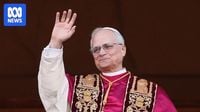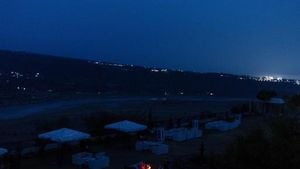On May 8, 2025, Cardinal Robert Francis Prevost made history as he emerged on the main balcony of St. Peter’s Basilica, officially taking on the papal name Pope Leo XIV. The crowd of pilgrims, tourists, and local Catholics erupted in applause, marking the momentous occasion of the first pope born in the United States. At 69 years old, Prevost's election was met with excitement and some surprise, given the traditional European dominance in the College of Cardinals.
Prevost’s journey to the papacy is rooted in a rich history with the Catholic Church. Born in Chicago, he joined the Order of St. Augustine at the age of 20, a mendicant order that emphasizes outreach and service. His extensive experience includes a decade in Peru, where he served as a seminary professor and later as bishop for the Diocese of Chiclayo. His appointment to various Vatican dicasteries in 2019, including the significant role of prefect of the Dicastery for Bishops, positioned him as a familiar figure within the church’s central administration.
His election comes at a time when the College of Cardinals is increasingly global, with Pope Francis having appointed many cardinals from diverse backgrounds. This shift has opened the door for leaders like Prevost, who bring a wealth of experience from regions previously underrepresented in the church hierarchy.
Prevost’s choice of the name Leo XIV resonates deeply with the legacy of Pope Leo XIII, who championed social justice and workers’ rights in his encyclical “Rerum Novarum.” In his inaugural address, Pope Leo XIV echoed this commitment to social issues, stating, “Peace be with you all,” and emphasizing the need for a “disarmed and disarming peace.” His call for dialogue and outreach reflects a continuation of Francis’ vision for the church, aiming to build bridges among different faiths and cultures.
As he addressed the crowd in Italian and Spanish, Prevost did not speak English, a decision that some interpreted as a nod to his commitment to inclusivity and outreach to the global Catholic community. His message of peace and unity set a hopeful tone for his papacy, suggesting a focus on healing divisions within the church, particularly in the United States, where tensions have escalated between conservative and progressive factions.
Prevost’s election is significant not only for its historical context but also for its potential implications for U.S. politics. The prospect of an American pope has long been a topic of debate, especially given the geopolitical influence of the United States. President Donald Trump praised the election as a great honor for the country, while critics within the far-right expressed concerns about Prevost’s perceived alignment with progressive values.
In a recent interview, Prevost’s brother, John, highlighted his brother’s moderate stance, suggesting that he would not shy away from addressing injustices, particularly regarding immigration policy. John Prevost stated, “I know he’s not happy with what’s going on with immigration. I know that for a fact.” This sentiment aligns with Pope Francis’ previous criticisms of U.S. immigration policies, including Trump’s border wall plans, indicating that Pope Leo XIV may continue to advocate for the marginalized and challenge political norms.
As the new pope prepares for his first public engagements, including a Mass with cardinals in the Sistine Chapel and a media audience, the world watches closely. His potential first foreign trip to Türkiye at the end of May, commemorating the 1,700th anniversary of the First Council of Nicaea, underscores his commitment to fostering interfaith dialogue and reconciliation.
Prevost’s background as a dual citizen of the U.S. and Peru, coupled with his extensive pastoral experience, positions him uniquely to navigate the complexities of modern Catholicism. His leadership style may reflect a blend of traditional values with a progressive approach, aiming to unite a divided church while remaining rooted in the teachings of Christ.
As the bells tolled in Lima, Peru, celebrating his election, the global Catholic community anticipates the direction Pope Leo XIV will take. His emphasis on dialogue, peace, and social justice could pave the way for a renewed focus on these critical issues within the church. Observers note that his election may signal a shift towards a more inclusive and compassionate church, one that addresses the pressing concerns of today’s world.
In the wake of his election, discussions surrounding Prevost’s views on key issues, such as immigration and social justice, are already underway. His brother’s comments suggest a willingness to engage with pressing societal challenges, hinting at a papacy that may not shy away from controversy but instead embrace it as an opportunity for dialogue and reform.
Pope Leo XIV’s election marks a pivotal moment in the history of the Catholic Church, reflecting broader shifts in its leadership and the global landscape. As he embarks on this new chapter, the hope is that he will foster a spirit of unity and understanding, guiding the church through the complexities of modern life with compassion and grace.





